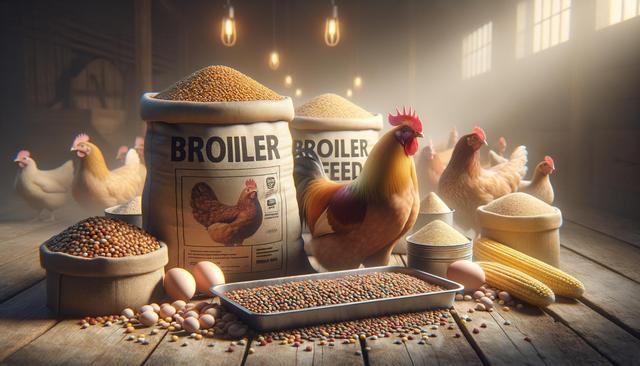
A Guide to Broiler Feeds: Choosing the Right Nutrition for Healthy Growth
The Importance of Broiler Feed in Poultry Farming
Broiler chickens require specific nutrition to support their rapid growth and overall health. The right feed not only promotes efficient weight gain but also helps boost immunity and reduce mortality rates. Feeding broilers with a balanced diet ensures optimal performance, which directly impacts the profitability of poultry farming operations. Whether you’re raising chickens for personal use or commercial production, selecting the appropriate chicken food is a crucial first step.
Feed quality, nutrient composition, and accessibility play a significant role in chicken development. Many poultry owners begin their flocks with a chick starter crumble, designed to provide essential nutrients during the early stages of growth. This feed is finely ground and easy for young chicks to digest, offering a high protein content that supports muscle development and bone strength. As broilers mature, their dietary needs change, requiring a gradual transition to grower and finisher feeds.
Types of Broiler Feeds and Their Purposes
Broiler feeds are typically divided into three categories that correspond with the bird’s stage of development: starter, grower, and finisher. Each type is formulated to meet the unique nutritional requirements of that specific growth phase.
- Starter Feed: Often in crumble form, this high-protein feed supports chicks from day one to about three weeks of age.
- Grower Feed: Introduced after the starter phase, grower feed has a slightly lower protein content and supports continued muscle and skeletal development.
- Finisher Feed: Given during the final weeks before processing, this feed promotes efficient weight gain and feed conversion ratios.
For those searching for chicken food near me, local farm supply stores and agricultural co-ops usually carry a variety of feed options tailored to each stage. Availability and freshness are important, as expired or poorly stored feed can lose nutritional value or become contaminated.
Medicated vs. Non-Medicated Feed
One key decision poultry owners must make is whether to use medicated or non-medicated feed. Medicated feed typically contains additives that help prevent common poultry diseases such as coccidiosis. This is particularly relevant in the early weeks when chicks are most vulnerable. For example, medicated chicken feed laying hens may be used when integrating new pullets into a flock to support their health during the transition.
However, there are guidelines on the use of medicated feed, especially when it comes to laying hens. Some medications are not approved for birds producing eggs for human consumption. Always check labels and consult with a veterinarian or livestock specialist to ensure compliance with local regulations.
It’s also worth noting that organic and non-medicated options are available for those who prefer a more natural approach. These feeds often include herbal supplements or probiotics to support gut health and immunity.
Feeding Tools and Techniques
Proper feeding tools can significantly reduce waste and ensure consistent access to nutrition. One common solution is the use of gravity-fed dispensers, such as grandpas chicken feeder, which help manage feed distribution efficiently. These devices minimize spillage and keep feed dry and clean, which is essential for maintaining flock health.
When feeding broilers, it’s important to monitor their intake and adjust quantities based on age and activity levels. Overfeeding can lead to obesity and health complications, while underfeeding may stunt growth and reduce productivity. Here are a few practical tips:
- Place feeders at back height to reduce feed spillage.
- Clean feeders regularly to prevent mold and bacteria buildup.
- Provide fresh water at all times alongside feed.
For those who prefer the convenience of shopping from home, chicken food online retailers offer a wide selection of feeds and accessories. This option can be especially helpful for remote poultry keepers who lack access to nearby suppliers.
Feed for Laying Hens and Long-Term Care
While broilers are typically raised for meat, some poultry owners transition their flocks into egg production. In these cases, the dietary needs of the birds shift. The best chicken feed for laying hens is formulated with higher levels of calcium and other nutrients necessary for consistent egg production and shell quality.
Maintaining a balanced diet is vital during this phase to support both the hen’s health and egg output. In addition to feed, consider offering supplemental calcium sources such as crushed oyster shells. Laying hens also benefit from access to pasture or kitchen scraps, which can provide variety and additional nutrients.
By understanding when and how to transition from broiler feed to layer feed, poultry owners can extend the productive life of their flock. It’s essential to make dietary changes gradually over the course of a week to avoid digestive issues or reduced egg production.
Conclusion: Choosing the Right Feed for Healthy Broilers
Feeding broiler chickens involves more than just offering any available grain. From choosing a quality chick starter crumble to selecting the right tools like grandpas chicken feeder, each decision impacts the health and growth of your flock. Whether you’re buying chicken food online or searching for chicken food near me, understanding the nutritional needs of your birds is key to successful poultry farming. For those transitioning to egg production, choosing the best chicken feed for laying hens and considering medicated chicken feed laying hens when appropriate can support long-term flock vitality. With careful planning and informed choices, you can raise healthy, productive chickens in any setting.

